Kultur in Gefahr - ITI
Kultur in Gefahr - ITI
Kultur in Gefahr - ITI
You also want an ePaper? Increase the reach of your titles
YUMPU automatically turns print PDFs into web optimized ePapers that Google loves.
30 Artistic Expression <strong>in</strong> a Corporate World<br />
Artistic Expression <strong>in</strong> a Corporate World 31<br />
Nevertheless, as we have seen before, the cultural doma<strong>in</strong> <strong>in</strong> any<br />
society has been confronted with an extremely urgent challenge. The<br />
fundamental human right that many voices can express themselves, can be<br />
heard, and can be discussed is acutely <strong>in</strong> danger. When cultural<br />
corporations take over cultural life, even more than is now the case, and<br />
when national, regional and local public authorities are no longer allowed<br />
to support the development of cultural diversity with<strong>in</strong> their territories and<br />
<strong>in</strong> relation with other parts of the world, then we will miss someth<strong>in</strong>g,<br />
namely the huge diversity of voices, melodies, texts, films, performances,<br />
books and images, which we need from a democratic perspective.<br />
What to do <strong>in</strong> this press<strong>in</strong>g situation? There is no sign that the<br />
present WTO is the place where basic human rights (such as: cultural<br />
democracy, the flourish<strong>in</strong>g of diverse cultural climates, and the<br />
ma<strong>in</strong>tenance of a broad public doma<strong>in</strong> for cultural developments) would be<br />
respected, promoted and susta<strong>in</strong>ed. This is not the <strong>in</strong>tention of WTO, and<br />
under current conditions never will be. Thus, should we try another<br />
Declaration on Cultural Diversity or another resolution, action plan,<br />
recommendation, or guidel<strong>in</strong>e on the importance of culture for societies, as<br />
several of them exist already? 6<br />
Obviously, these are important documents that raise awareness<br />
about the importance of cultural diversity, but they do not have a b<strong>in</strong>d<strong>in</strong>g<br />
legal force at a global level and have no competence to <strong>in</strong>tervene <strong>in</strong> favour<br />
of cultural diversity or on the rules and regulations concern<strong>in</strong>g global<br />
commerce. In chapter 1 we have seen how and why the US left Unesco <strong>in</strong><br />
1985: for the transplantation of culture to the sector where commercial<br />
<strong>in</strong>terests are the only players <strong>in</strong> the market place.<br />
The only solution to safeguard cultural diversity is to take culture<br />
out of WTO. Then, it will no longer be subject to the permanent pressure<br />
of treat<strong>in</strong>g the arts, <strong>in</strong> all its forms, sizes and genres, as trade products.<br />
Then, the risk that cultural diversity will disappear <strong>in</strong> the offertory-box of<br />
full blown trade liberalisation will be over. Then, public authorities will<br />
aga<strong>in</strong> be able to create the conditions, <strong>in</strong>clud<strong>in</strong>g the implementation of<br />
regulative measures, so that a great variety of artistic creations and<br />
presentations can flourish.<br />
In order to make a Convention on Cultural Diversity viable, it is<br />
necessary for countries to make no commitments with<strong>in</strong> WTO that may<br />
liberalize their cultural markets, notwithstand<strong>in</strong>g the enormous pressure<br />
they experience dur<strong>in</strong>g the present Doha Round negotiations. For,<br />
however it may be, WTO is a fly-trap. Once a country is <strong>in</strong>, it is nearly<br />
impossible to get out of the commitments that the country has made. The<br />
price is simply too high, as with the example of New Zealand, which, as<br />
already mentioned before, made commitments <strong>in</strong> 1993 to open up their<br />
audiovisual market. Despite the US propaganda that GATS is a very<br />
flexible treaty (you enter, and leave when you may wish to do so), the<br />
reality is different. Countries should refuse to make commitments with<strong>in</strong><br />
the framework of WTO which could compromise their ability to achieve<br />
their cultural policy aims. At the same time they should be careful that the<br />
proposed Convention on Cultural Diversity does not become an empty<br />
box, because governments have already given away their competence to<br />
make those regulations and to susta<strong>in</strong> those support systems as they<br />
judge appropriate for the protection of cultural diversity.<br />
6 See, for <strong>in</strong>stance, Unesco’s Action Plan on Cultural Policies for Development,<br />
adopted <strong>in</strong> the Intergovernmental Conference on Cultural Policies for Development,<br />
Stockholm, Sweden, 2 April 1998; Council of Europe’s Declaration on Cultural<br />
Diversity, Strasbourg, 7 December 2000; Unesco’s Universal Declaration of Cultural<br />
Diversity, and its Action Plan, Paris, 2 November 2001.



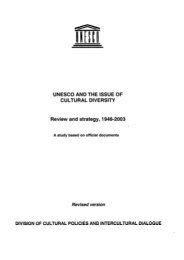

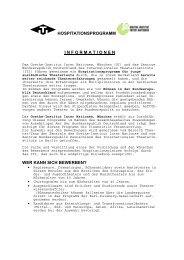

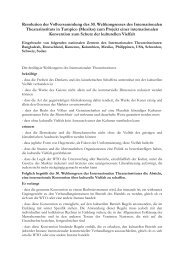
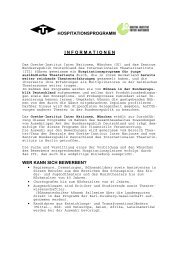
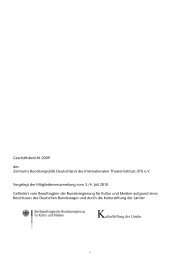
![Geschäftsbericht 2010 [pdf 2 MB] - ITI](https://img.yumpu.com/4380475/1/184x260/geschaftsbericht-2010-pdf-2-mb-iti.jpg?quality=85)